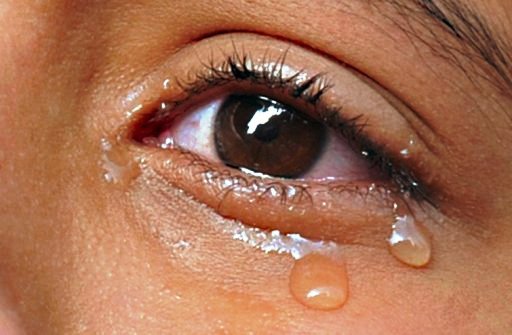
Women really do cry more than men
Women average around two to four times a month, while men might cry once every other month, says Ad Vingerhoets, a professor of clinical psychology at Tilburg University in the Netherlands. His research also found that women cry for longer than men. 66% of men said they keep a crying session short, less than five minutes, while 43% of women said the same. Only 24% of men admitted to crying it out for six to 15 minutes, compared to 38% of women. We’re not all that different when it comes to major triggers of tears, though, Vingerhoets says. Big stuff, like a death or a breakup, is likely to make both men and women cry. “The difference between the sexes is stronger when you look at very mundane, everyday situations,” he says. Women are more likely to cry in scenarios that trigger helplessness, he explains, like when the car won’t start or the computer crashes. Well, that explains a lot!
Tears bond us together
The latest happening theory as to why adults cry is that the very action of crying has something to do with human connection. Something to think about — visible tears rolling down the cheeks of a stranger on television (think emotional movies!), instantly makes you feel for her or him, even if you’ll never see them again. The thinking goes that tears help us recognise when a fellow human needs a little extra attention, fostering bonding that, even if it’s not exactly key to the survival of the species, let’s face it — we could all use from time to time. “Tears seem to be a strong signal to others that you are in need of help,” Vingerhoets explains. “We have found that when you see someone in tears, you tend to feel more connected with that person, you feel more empathy,” he says. “That’s a very important interpersonal effect of tears.” Who would have thought!
7 ways to set up a productive cubicle
Your nose runs when you cry because it’s sharing the hard work
Tears secreted from the lacrimal glands — whether they are the tears coming from chopping onions or the emotional ones — drain near the nose. “When the capacity of the drainage system is insufficient, then tears start flowing over your cheeks, and that’s what we call crying,” Vingerhoets says. In other words, your nose runs even before you cry, and can certainly keep it up while you’re sobbing, because your tears are simply draining. “Most of our tears just go back into the body,” he says. Who would have thought!
Tears do not contain stress hormones
Although the research surrounding what makes a “good” cry is muddled, certainly anecdotally many of us have experienced that feeling of release and relief after letting the tears flow. An older theory is that because tears contain stress hormones, crying is a way to flush those hormones out of the body, reducing negativity in the process. But Vingerhoets doesn’t agree. “It makes just as much sense to say that drooling helps to relieve you from stress,” he says. “The composition of saliva is very similar to tears.” Even sweat contains stress hormones, he adds, “but the conclusion that this reaction is meant to cleanse stress hormones from the blood makes absolutely no sense.”
7 tips doctors give about wearing flip-flops
Men get repulsed by tears
The most interesting fact! And no, not in a callous “I can’t handle her feelings” kind of way. In fact, the reason is completely scientific. When men were made to sniff negative emotion tears from women, they felt less stimulated and more agitated than when they smelled a saline solution that had also run down women’s cheeks. Yes, sometimes scientific studies can be bizarre, we agree. Some experts hypothesise that men’s non-stimulated reaction might be a way to lessen men’s aggression when women are crying. Interesting right?
Published in The Express Tribune, April 2nd, 2016.
Like Life & Style on Facebook, follow @ETLifeandStyle on Twitter for the latest in fashion, gossip and entertainment.





1732620609-0/Untitled-design-(9)1732620609-0-270x192.webp)
1732609662-0/Express-Tribune-(5)1732609662-0-270x192.webp)

1732607724-0/Express-Tribune-(4)1732607724-0-270x192.webp)
1732600740-1/Untitled-design-(1)1732600740-1-270x192.webp)







COMMENTS
Comments are moderated and generally will be posted if they are on-topic and not abusive.
For more information, please see our Comments FAQ